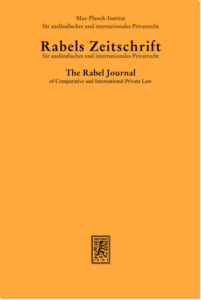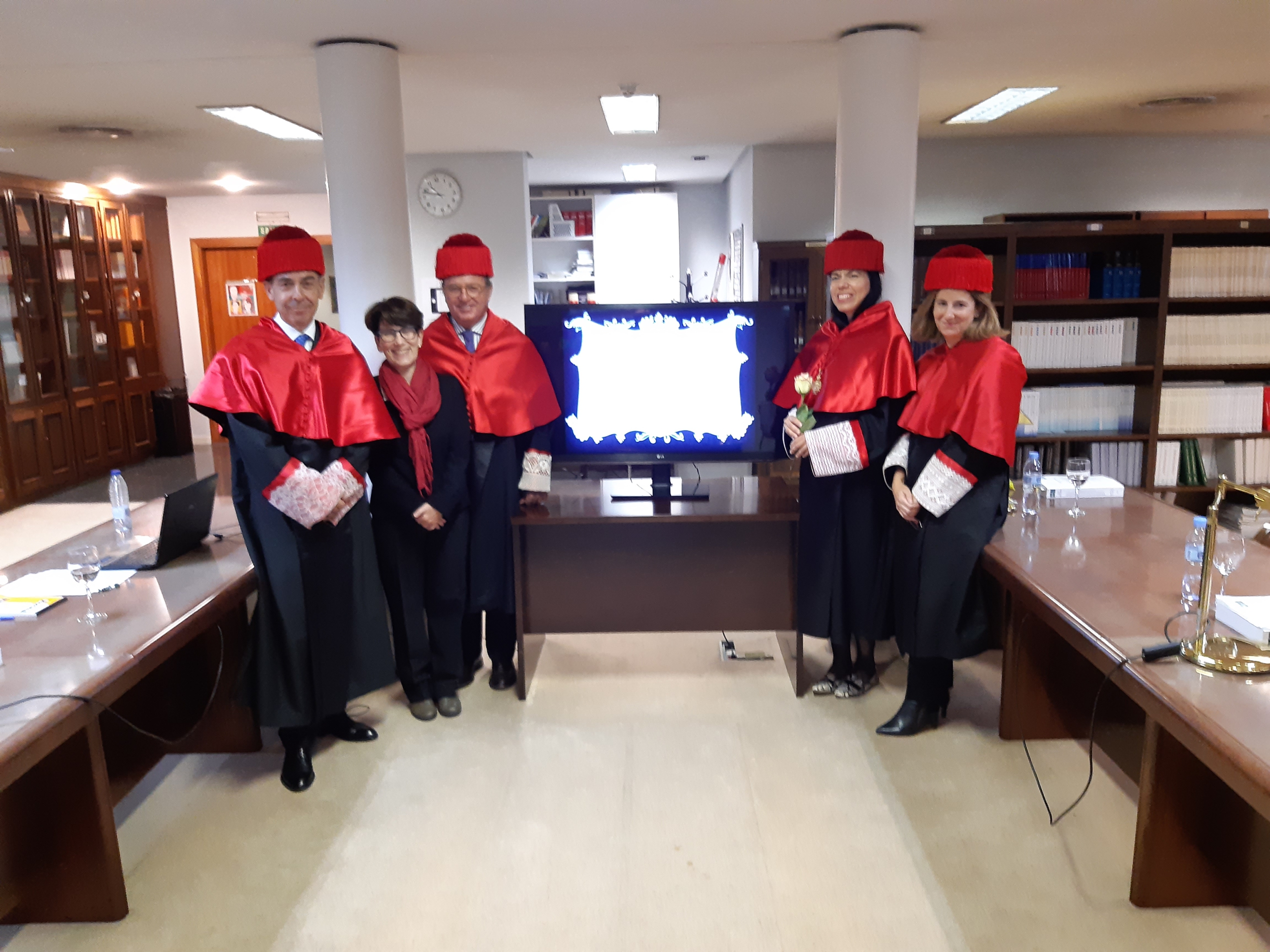 The fourth issue of RabelsZ 2022 has just been released. It contains the following articles:
The fourth issue of RabelsZ 2022 has just been released. It contains the following articles:
Moritz Renner / Torsten Kindt: Internationales Gesellschaftsrecht und Investitionsschutzrecht, pp. 787–840, DOI: 10.1628/rabelsz-2022-0078
Conflict of Corporate Laws and International Investment Law. – The withdrawal of the United Kingdom from the EU has revived the debate on the conflict of corporate laws. Much attention has recently been given to the new generation of EU free trade agreements, such as the EU-UK Trade and Cooperation Agreement, but their impact on conflicts in the field of corporate law remains unclear. This article proposes that the conflict-of-law effects of these agreements can be fully understood only in the light of their common background in international investment law. Building upon an analysis of the role of treaties in Germany’s conflict-of-law system and of the multiple intersections between the conflict of corporate laws and international investment law in general, the article demonstrates that the newest EU free trade agreements imply in particular the application of a restricted conflict-of-law theory of incorporation on foreign corporations originating from the respective signatory states. While the agreements’ effects on conflicts in the corporate law arena are not as far reaching as those of the EU’s freedom of establishment, they nevertheless further narrow the remaining scope of application of the traditional seat theory underlying Germany’s autonomous rules on conflicts vis-à-vis corporate law.
Tobias Lutzi / Felix M. Wilke: Brüssel Ia extendenda est? – Zur Zukunft der internationalen Zuständigkeit deutscher Gerichte in Zivil- und Handelssachen nach Ausweitung der EuGVVO, pp. 841–875, DOI: 10.1628/rabelsz-2022-0079
Brussels I bis extendenda est? On the Future of the International Jurisdiction of German Courts in Civil and Commercial Matters after an Extension of the Regulation. – With the expiry of the deadline of art. 79 Brussels I bis, the academic debate on a possible further extension of the Regulation to situations involving non-EU defendants is (again) gaining momentum. The present study aims to contribute to this discussion. It compares the relevant German rules on international jurisdiction over non-EU defendants with those of the Brussels I bis Regulation in order to be able to assess the consequences of a possible extension from a German perspective. The study reveals that even replacing the national rules in their entirety would not amount to a radical change. In particular, the addition of typified places of performance under art. 7 no. 1 lit. b Brussels I bis to the forum contractus and the availability of a common forum for joint defendants under art. 8 no. 1 Brussels I bis would constitute welcome improvements of the current framework. The loss of jurisdiction based on the presence of assets under § 23 ZPO would arguably be a disadvantage if not properly compensated for, e.g. through a forum necessitatis provision. The biggest advantage, though, would most likely be the harmonization of the law of international jurisdiction across the EU – which, from a German perspective, would come at a rather reasonable price.
Ulla Liukkunen: Decent Work and Private International Law, pp. 876–904, DOI: 10.1628/rabelsz-2022-0080 [Open Access]
This article examines the decent work objective set by the ILO and UN Agenda 2030 from the point of view of private international law. It conceptualizes decent work, arguing that inclusivity of protective safeguards and structures in cross-border situations is essential to achieving the objective, and that the need for inclusivity draws attention to the relationship between labour law and private international law. The analysis offered also introduces a migration law-related perspective on decent work and the private international law of employment contracts and labour relations more generally. It is argued that understanding that the idea of inclusivity is embedded in the decent work objective brings up a global dimension which calls for uniform regulatory solutions at the international level. Decent work could be coupled relatively easily with the need for a revival of the private international law of labour relations and for developing a labour rights-based approach in private international law. It also connects private international law’s protective normative frameworks to the body of international labour standards.
Adrian Hemler: Virtuelle Verfahrensteilnahme aus dem Ausland und Souveränität des fremden Aufenthaltsstaats – Zugleich ein Beitrag zum Verhältnis des Völkerrechts zum Kollisionsrecht, pp. 905–934, DOI: 10.1628/rabelsz-2022-0081
Virtual Participation in Court Proceedings from Abroad and Its Effects on the Sovereignty of the Foreign State of Residence – With Consideration of the Relationship Between Public International Law and the Conflict of Laws. – Most German-speaking scholars and some German courts consider participation in virtual court proceedings from a foreign state of residence to be a violation of foreign sovereignty. This essay stakes out a contrary position. In reaching this conclusion, it focuses on the distinction between the exercise of state power abroad and the exercise of state power regarding foreign facts. Especially with regards to extraterritorial legislation, it is argued that the law’s scope of sovereign validity remains territorial even if its scope of application covers facts abroad. The discussion also shows how this distinction is equally applicable to court judgments that concern foreign elements. Furthermore, the article discusses the nature of public international law principles regarding extraterritorial legislation and their relationship to national conflict of laws provisions. Also considered is how the sovereignty principle ought to be understood in cyberspace. Having established this theoretical foundation, it is concluded that regardless of the procedural role of the respective party, participation in virtual court proceedings from a foreign state of residence does not amount to a violation of foreign sovereignty.
Corinna Coupette / Dirk Hartung: Rechtsstrukturvergleichung, pp. 935–975, DOI: 10.1628/rabelsz-2022-0082 [Open Access]
Structural Comparative Law. – Structural comparative law explores the similarities and differences between the structures of legal systems. Theoretically grounded in systems theory and complexity science, it models legal systems as networks of documents, organizations, and individuals. Using methods from network analysis, structural comparative law measures these networks, assesses how they change over time, and draws quantitative comparisons between multiple legal systems. It differs from other approaches in its assumptions, its methods, and its goals, in that it acknowledges the relevance of dependencies between system entities and borrows more heavily from data science than from econometrics. Structural comparative law constitutes a novel addition to the comparatist’s toolbox, and it opens myriad opportunities for further research at the intersection of comparative law and data science.
Arseny Shevelev / Georgy Shevelev: Proprietary Status of the Whole Body of a Living Person, pp. 976–997, DOI: 10.1628/rabelsz-2022-0083
This article is a reaction to the growing economic significance of the living human body as well as its legal status. In this paper, we argue that ownership in the human body most effectively guarantees the autonomy of the human will as to the use and disposal of one’s own body, but classical ownership theory is unable to fully ensure the autonomy of the human will, since it risks reviving the institution of slavery. We will demonstrate that theories establishing rights to the body other than ownership rights are limited in content and are inherently inconsistent. At the end of the article, we will propose an abstract ownership theory that allows for the exercise of maximum freedom to dispose of the human body while one is alive and which will be devoid of the flaws of the preceding theories.


 The fourth issue of RabelsZ 2022 has just been released. It contains the following articles:
The fourth issue of RabelsZ 2022 has just been released. It contains the following articles:

